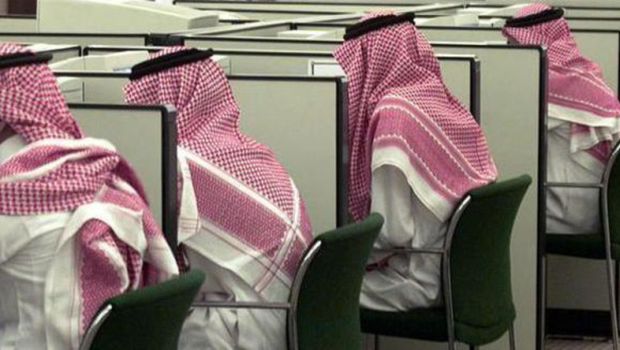
Saudi students attend a computer class at the King Saud University in Riyadh on October 30, 2002. The Saudi Labor Ministry announced an unemployment benefits scheme on Monday designed to attract young entrants to the labor market to work in private sector companies. (Reuters/Ali Jarekji)
Dammam, Asharq Al-Awsat—The Saudi Cabinet approved an unemployment benefits scheme for Saudi workers on Monday during a meeting headed by Vice Custodian of the Two Holy Mosques Crown Prince Salman bin Abdulaziz Al Saud.
The new scheme will provide benefits for up to 12 months to those who have lost their jobs, said a Labor Ministry press release.
It will be set at a rate of 60 percent of the employee’s average salary earned over the previous three years for the first three months, and then at 50 percent of that salary for the remaining nine.
All workers will now be charged 1 percent of their monthly salary as a compulsory subscription, with their employer paying the same amount.
Benefits will be capped at 9,000 Saudi rials (2,400 US Dollars) for the first three months and 7,000 rials for the rest of the year, with a minimum payment of 2,000 rials.
The new scheme aims to boost private sector employment in the Kingdom in order to tackle long-term unemployment.
The government hopes the new incentives will lead more of the country’s younger workforce to seek employment at private companies, which are currently outcompeted in the Saudi labor market by public sector institutions offering attractive starting salaries and generous employee benefits.
Saudi private sector employment featured prominently during a December meeting in Riyadh, ‘The Private Sector in the Middle East—How Can It Contribute More to Growth,’ co-hosted by the Council of Saudi Chambers, the International Financial Corporation (IFC), and the International Monetary Fund (IMF).
After the meeting IMF Deputy Managing Director Min Zhu said that the private sector in the Kingdom must help absorb new entrants into the workforce, expected to be 1.5–2 million over the next decade.
Official unemployment figures in the Kingdom currently stand at around 12 percent, but some economists estimate that only 30–40 percent of the potential adult workforce is currently employed.
Most of those who are employed work for the state, which is now facing a heavy wage bill.
Speaking to Reuters, a director at Fitch Earnings said that if “there is a guarantee of income, particularly when that is connected to the level of previous earnings, it should make people more comfortable with taking positions in the private sector.”
Gamble said that while the new scheme would not be cost effective in the short term, it was a “price worth paying,” as it would help stabilize the country’s labor market in the long run.
The scheme will be available to all Saudi workers in both the private and public sectors providing they have not left work voluntarily, have been subscribed to the country’s current pension and social insurance scheme for no less than 12 months, do not have income from other sources, and are not over the age of 59.
The pension age in Saudi Arabia is 60 for men and 55 for women.
A new state insurance body will now be set up within six months to administer the scheme.
Saudi Arabia announced its 2014 state budget on December 23, with a year-on-year jump in spending of 4.3 percent, totaling a record 855 billion rials (228 billion US dollars), much of it earmarked for job creation.
